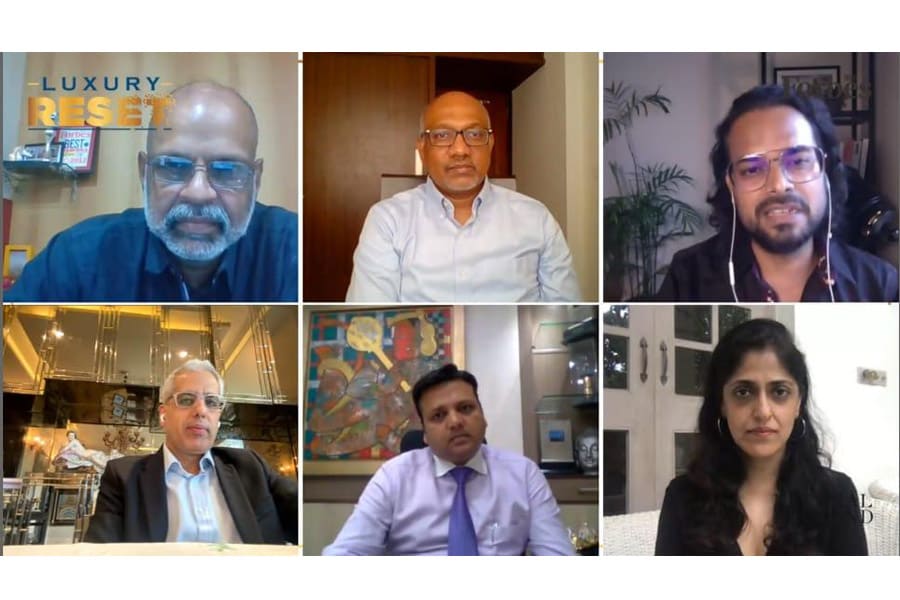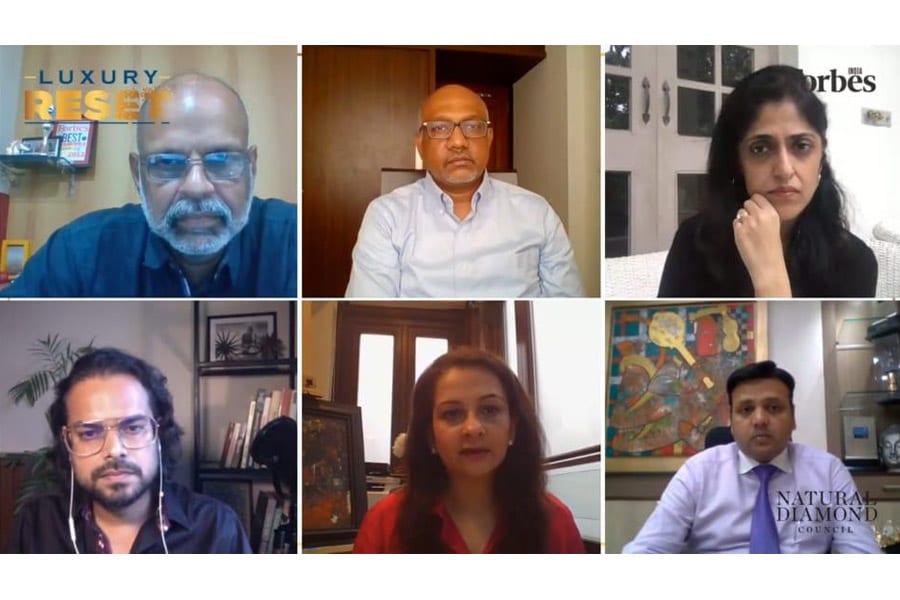Evolution and Transitions in India's Luxury Market post-COVID
Discerning customers demonstrate responsible luxury choices


In one fell swoop, the Covid-19 pandemic disrupted the entire economy. It necessitated some temporary changes and also wreaked some permanent transformations in the business ecosystem. Within this unprecedented milieu, the Indian Luxury segment sought to explore the present priorities of its patrons and what the post-COVID future holds in store for it.
To garner valuable insight around the challenges, trends and opportunities for the Indian Luxury sector in the post-Covid world, Forbes India hosted a virtual conversation - Forbes India Luxury Reset, powered by Natural Diamond Council. The panel comprised representatives of some the most distinguished brands in their respective sectors. Moderated by Brian Carvalho, the participants were Prashant Gaurav Gupta, Vice President & Head, Luxury Malls - DLF Emporio & The Chanakya Rahul Mishra, Founder and Creative Director, Rahul Mishra Designs Aditi Dugar, Founder, Masque restaurant and Sage & Saffron Minal Vazirani, Co-founder, Saffronart Samir Saran, Managing Partner, India Sotheby’s International Realty PB Venugopal, President, Lexus India and Richa Singh, Managing Director, India, Natural Diamond Council.The deliberations deep-dived into the impact of the pandemic on consumer behaviour, especially the mindset of India’s luxury consumers in two predominant segments - high net worth individuals and millennials.
Highlighting a new consumption factor that has evolved during the ongoing pandemic, Aditi Dugar pointed out, “Consumers are buying into everyday luxury. Whether it"s a luxurious care package or a celebration with the close ones, people are definitely more conscious as buyers. They prefer to go with trusted brands and believe in the quality and service.”
Rahul Mishra observed that indistinct formats, like multi-brand retail stores and super large chains, were struggling even before COVID-19. The pandemic was a catalyst that aggravated this struggle. He also opined that Covid-19 related lockdowns and the change in consumer behavior had already made branding transparent as even premium brands interact with consumers on social media. “It is not just about budgets and creative energy anymore, but how much honesty and integrity you have in your communication and, finally, what your product looks like. So, the age-old idea of making cheap products and letting branding take care of their future is out.”Addressing the concern that brick and mortar stores would get replaced by online shopping in the retail space, Prashant Gaurav Gupta said, “There has definitely been a shift towards online purchases and the current crisis has triggered a spike that trend. But brick and mortar purchases are not going anywhere, as far as luxury shopping is concerned.” He explained that consumers want to experience a luxury product with all their five senses before buying it. “A luxury product purchase is not just transactional.” In fact, he recounted how initially, when his malls opened, footfalls had fallen and only very dedicated shoppers continued to visit the premises. However, in the recent past, the numbers had improved and traffic at the mall has picked up.
Agreeing that luxury is a very emotive decision, Samir Saran uncovered another aspect of luxury purchases, saying, “The pandemic and the lockdowns have allowed people to reflect on life in general. There is a convergence between what is deemed to be luxury and what"s deemed to be a necessity, especially in the business of selling homes. Today, the home is considered by more than just an abode it is a refuge during a flight to safety.”
As a result, he recounted that especially the ultra-high net worth and high net worth end of the market has begun to seek utility in homes. “The home is evolving in terms of what it has to be it has to be a de-facto school and an impromptu office. Consequently, people are looking at upgrading homes. They want larger homes as the utility of the home changes. People are also considering whether India is the right place to build a home and are looking overseas too.”
Representing an ultra-luxury product, which is a complete discretionary spend, Lexus India’s PB Venugopal shared his experience, saying, “In the first two months of the lockdowns, our patrons were definitely focused on their respective businesses, reprioritizing spends to revamp and revisit their strategies. They also prioritized and focused on their employees’ wellbeing. But now we are slowly seeing the market inching back and they are looking at spending on responsible luxury.” Further, he shared that his engagement with clients was never a push sale. “It involves relationship building for the entire lifecycle. In the current times, we have been attentive to servicing of cars and interacting virtually with our clients, offering them DIY experiences.”
Shifting to the subject of millennials, he said, “We strongly believe millennials will contribute to the luxury segment. Even for the older buyers, they play a big role in decision making in this segment.”
Richa Singh agreed that millennials were very confident and certain in their unique consumption choices. “A lot of millennials pick up ancestral pieces of jewellery and then style these in a modern way.” Another insight she shared was that consumers were going back to jewellers they trust and they want fewer things with higher emotional value. Most importantly, India, which has predominantly been a gold jewellery market, is now looking at more responsible spending. “The diamond industry has consciously worked on transparency and trust, and that should translate to growth,” she said.
In the same vein, Minal Vazirani added, “Art isn"t typically an impulse buy. During the lockdown, people had more time to learn about art and engage with it before making purchase decisions.” Another critical observation she shared was the idea of being local. “There will be consolidation of luxury spends and consumption around accessibility,” she explained.
The participants agreed that perceptions about luxury in the minds of its discerning consumers were changing in myriad ways. Some of these changes were motivated by the COVID-19 crisis but others were simply evolutionary trends. Purchases were no longer motivated by peer pressure. Going forward, luxury would be all about accountability in processes and pricing from young buyers.
“A year from now, purchases will still be limited. People will be conscious memories of what we"ve gone through will be fresh. But people will look at celebrating the here and now,” concluded Richa Singh.
Disclaimer: The views, suggestions and opinions expressed here are the sole responsibility of the experts. No Forbes India journalist was involved in the writing and production of this article.
First Published: Sep 02, 2020, 13:27
Subscribe Now

